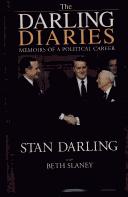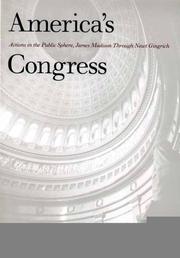| Listing 1 - 10 of 473 | << page >> |
Sort by
|

ISBN: 1281962503 9786611962500 1770700803 1554883210 9781554883219 9781281962508 1550022539 9781550022537 6611962506 9781770700802 Year: 1995 Publisher: Toronto Dundurn Press
Abstract | Keywords | Export | Availability | Bookmark
 Loading...
Loading...Choose an application
- Reference Manager
- EndNote
- RefWorks (Direct export to RefWorks)
A stalwart Tory, Stan Darling was a Member of Parliament for twenty-one years. In The Darling Diaries, he looks back on his career in politics, the places he has been, and some of the poeple he has met -- Libyan dictator Gaddafi, President Bush, and Maharishi Mahesh Yogi. Never afraid of the press or anyone else foolish enough to quarrel with him, he strenuously advocated (and got) controls on the emmissions which cause acid rain -- for which he earned the nickname Mr. Acid Rain. He helped to get a free vote on the death penalty in Parliament. Whether in his native Burks Falls, Ontar
Legislators --- Politicians --- Lawmakers --- Legislatures, Members of --- Members of legislatures --- Members of parliaments --- Parliaments, Members of --- Statesmen
Book
Year: 2017 Publisher: FedOA - Federico II University Press
Abstract | Keywords | Export | Availability | Bookmark
 Loading...
Loading...Choose an application
- Reference Manager
- EndNote
- RefWorks (Direct export to RefWorks)
During the First World War, the parliaments of the states involved in the conflict were, in most cases, forced to drastically limit their activity and were often precluded the possibility of fully exercising their prerogatives. More generally the spaces of freedom granted to the citizens, of which the parliamentary institution was the brightest symbol, shrank dramatically. At the same time, the power of military commands expanded, not only in trenches and on battlefields, but also in many areas of civilian life. However, in the final years of the war, the Parliaments succeeded not only in gradually regaining control, but also in pushing for an extension of their functions, initiating a process that in many states coincided with the transition from a liberal order to a full democratic order. The years of the "long" postwar period were however dense with contradictions. Legislative and executive law often grew together, while in some cases the imperative logic imposed for a long time in wartime re-emerged and consolidated. This volume, which examines several national cases, illustrates some of the ambivalent features of this dramatic phase of European history.
Military Power --- Welfare State --- First World War --- Parliaments --- Royal Prerogative
Book
Year: 2018 Publisher: FedOA - Federico II University Press
Abstract | Keywords | Export | Availability | Bookmark
 Loading...
Loading...Choose an application
- Reference Manager
- EndNote
- RefWorks (Direct export to RefWorks)
The volume edits all sources relating the Neapolitan parliaments during the Aragonese era. Reintroducted in Southern Italy by Alfonso the Magnanimous, parliaments were an important institution for the relations between the Crown, the barons ad the desmenial towns, although it was not the only occasion of negotiating. The analysis of seventeen parliaments and other similar assemblies (regional parliaments, afforced Royal Councils) allow us to study the entire history of the Kingdom from 1441 to 1500. In this context the authors examine the parliaments’ proceedings, records, motivations and conclusions. The Neapolitan parliaments were not regular but had important different functions, according to the historical context and the different positions of the Kings, on one side, and of summoned members, on the other side. Taxation and justice were the main issues of the political and symbolic confrontation between the sovereign and the subjects.
Justice --- Aragonese Kingdom of Neaples --- Medieval parliaments --- Taxation
Book
Year: 2017 Publisher: FedOA - Federico II University Press
Abstract | Keywords | Export | Availability | Bookmark
 Loading...
Loading...Choose an application
- Reference Manager
- EndNote
- RefWorks (Direct export to RefWorks)
During the First World War, the parliaments of the states involved in the conflict were, in most cases, forced to drastically limit their activity and were often precluded the possibility of fully exercising their prerogatives. More generally the spaces of freedom granted to the citizens, of which the parliamentary institution was the brightest symbol, shrank dramatically. At the same time, the power of military commands expanded, not only in trenches and on battlefields, but also in many areas of civilian life. However, in the final years of the war, the Parliaments succeeded not only in gradually regaining control, but also in pushing for an extension of their functions, initiating a process that in many states coincided with the transition from a liberal order to a full democratic order. The years of the "long" postwar period were however dense with contradictions. Legislative and executive law often grew together, while in some cases the imperative logic imposed for a long time in wartime re-emerged and consolidated. This volume, which examines several national cases, illustrates some of the ambivalent features of this dramatic phase of European history.
Military Power --- Welfare State --- First World War --- Parliaments --- Royal Prerogative
Book
Year: 2018 Publisher: FedOA - Federico II University Press
Abstract | Keywords | Export | Availability | Bookmark
 Loading...
Loading...Choose an application
- Reference Manager
- EndNote
- RefWorks (Direct export to RefWorks)
The volume edits all sources relating the Neapolitan parliaments during the Aragonese era. Reintroducted in Southern Italy by Alfonso the Magnanimous, parliaments were an important institution for the relations between the Crown, the barons ad the desmenial towns, although it was not the only occasion of negotiating. The analysis of seventeen parliaments and other similar assemblies (regional parliaments, afforced Royal Councils) allow us to study the entire history of the Kingdom from 1441 to 1500. In this context the authors examine the parliaments’ proceedings, records, motivations and conclusions. The Neapolitan parliaments were not regular but had important different functions, according to the historical context and the different positions of the Kings, on one side, and of summoned members, on the other side. Taxation and justice were the main issues of the political and symbolic confrontation between the sovereign and the subjects.
Justice --- Aragonese Kingdom of Neaples --- Medieval parliaments --- Taxation
Book
Year: 2017 Publisher: FedOA - Federico II University Press
Abstract | Keywords | Export | Availability | Bookmark
 Loading...
Loading...Choose an application
- Reference Manager
- EndNote
- RefWorks (Direct export to RefWorks)
During the First World War, the parliaments of the states involved in the conflict were, in most cases, forced to drastically limit their activity and were often precluded the possibility of fully exercising their prerogatives. More generally the spaces of freedom granted to the citizens, of which the parliamentary institution was the brightest symbol, shrank dramatically. At the same time, the power of military commands expanded, not only in trenches and on battlefields, but also in many areas of civilian life. However, in the final years of the war, the Parliaments succeeded not only in gradually regaining control, but also in pushing for an extension of their functions, initiating a process that in many states coincided with the transition from a liberal order to a full democratic order. The years of the "long" postwar period were however dense with contradictions. Legislative and executive law often grew together, while in some cases the imperative logic imposed for a long time in wartime re-emerged and consolidated. This volume, which examines several national cases, illustrates some of the ambivalent features of this dramatic phase of European history.
Military Power --- Welfare State --- First World War --- Parliaments --- Royal Prerogative
Book
Year: 2018 Publisher: FedOA - Federico II University Press
Abstract | Keywords | Export | Availability | Bookmark
 Loading...
Loading...Choose an application
- Reference Manager
- EndNote
- RefWorks (Direct export to RefWorks)
The volume edits all sources relating the Neapolitan parliaments during the Aragonese era. Reintroducted in Southern Italy by Alfonso the Magnanimous, parliaments were an important institution for the relations between the Crown, the barons ad the desmenial towns, although it was not the only occasion of negotiating. The analysis of seventeen parliaments and other similar assemblies (regional parliaments, afforced Royal Councils) allow us to study the entire history of the Kingdom from 1441 to 1500. In this context the authors examine the parliaments’ proceedings, records, motivations and conclusions. The Neapolitan parliaments were not regular but had important different functions, according to the historical context and the different positions of the Kings, on one side, and of summoned members, on the other side. Taxation and justice were the main issues of the political and symbolic confrontation between the sovereign and the subjects.
Justice --- Aragonese Kingdom of Neaples --- Medieval parliaments --- Taxation
Book
ISBN: 1282268260 9786612268267 0191536350 1423788788 Year: 2005 Publisher: Oxford ; New York : Oxford University Press,
Abstract | Keywords | Export | Availability | Bookmark
 Loading...
Loading...Choose an application
- Reference Manager
- EndNote
- RefWorks (Direct export to RefWorks)
An almost universal point of agreement in contemporary political science is that 'institutions matter'. But the governing institutions of the European Union are widely presumed to matter more than most. A commonplace assumption about the EU is that those working within European institutions are subject to a pervasive tendency to become socialized into progressively more pro-integration attitudes and behaviours. The assumption has been integral to many accounts of Europeanintegration, and is also central to how scholars study individual EU institutions. However, the theoretical and empirical ad
Legislators --- European Parliament. --- Lawmakers --- Legislatures, Members of --- Members of legislatures --- Members of parliaments --- Parliaments, Members of --- Statesmen --- European Communities. Parliament

ISBN: 1281722235 9786611722234 0300130023 9780300130027 9780300080490 0300080492 9781281722232 6611722238 Year: 2000 Publisher: New Haven : Yale University Press,
Abstract | Keywords | Export | Availability | Bookmark
 Loading...
Loading...Choose an application
- Reference Manager
- EndNote
- RefWorks (Direct export to RefWorks)
To understand American politics and government, we need to recognize not only that members of Congress are agents of societal interests and preferences but also that they act with a certain degree of autonomy and consequence in the country's public sphere. In this illuminating book, a distinguished political scientist examines actions performed by members of Congress throughout American history, assessing their patterns and importance and their role in the American system of separation of powers. David R. Mayhew examines standard history books on the United States and identifies more than two thousand actions by individual members of the House and Senate that are significant enough to be mentioned. Mayhew offers insights into a wide range of matters, from the nature of congressional opposition to presidents and the surprising frequency of foreign policy actions to the timing of notable activity within congressional careers (and the way that congressional term limits might affect these performances). His book sheds new light on the contributions to U.S. history made by members of Congress.
Legislators --- Lawmakers --- Legislatures, Members of --- Members of legislatures --- Members of parliaments --- Parliaments, Members of --- Statesmen --- History. --- United States.
Book
ISBN: 9021835932 9789021835938 Year: 1986 Publisher: Amsterdam: Sijthoff,
Abstract | Keywords | Export | Availability | Bookmark
 Loading...
Loading...Choose an application
- Reference Manager
- EndNote
- RefWorks (Direct export to RefWorks)
Legislators --- Lawmakers --- Legislatures, Members of --- Members of legislatures --- Members of parliaments --- Parliaments, Members of --- Statesmen --- Netherlands --- Politics and government --- Legislators - Netherlands --- Netherlands - Politics and government - 1945 --- -Legislators
| Listing 1 - 10 of 473 | << page >> |
Sort by
|

 Search
Search Feedback
Feedback About UniCat
About UniCat  Help
Help News
News